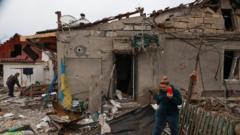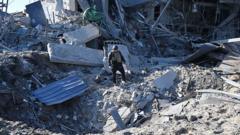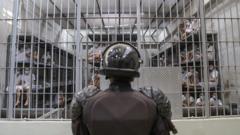Amidst ongoing conflicts, Putin's announcement of a short-lived ceasefire sparks debate about its legitimacy and prospects for peace.
Putin's 'Easter Truce': A Fragile Hope or a Political Facade?

Putin's 'Easter Truce': A Fragile Hope or a Political Facade?
As the Easter truce raises questions, skepticism looms over Russia's intentions in Ukraine.
The recent announcement of a unilateral Easter truce by President Vladimir Putin, set to last from Saturday until midnight Sunday, is stirring a mixture of hope and skepticism in Ukraine. While the Kremlin cites "humanitarian" reasons for the truce, Ukrainian President Volodymyr Zelensky quickly pointed out that Russian forces may be using this announcement to mask continued military actions.
Despite agreeing to a comprehensive ceasefire proposed by the Trump administration last month, Russia has shown reluctance, responding instead with conditions and ultimately declaring only a 30-hour truce. On social media, Zelensky expressed concerns that the Russian military was merely trying to create the illusion of peace, with ongoing reports of isolated attacks continuing in certain areas of conflict.
In contrast, the Russian Defence Ministry claims strict adherence to the ceasefire. They accuse Ukraine of being the first to breach the truce, which they term the "special military operation" in Ukraine. As the situation unfolds, the question remains: is this short ceasefire a public relations move by the Kremlin, or is it a genuine step towards resolution?
Skeptics suggest that the timing of this truce coincides with a need to rekindle relations with the returning Trump administration, which has shown increasing impatience with the lack of movement toward peace in Ukraine. With Trump threatening to abandon negotiations if no progress is made, the Russian government may be seeking to position itself as the pro-peace party in the international arena.
However, the unexpected nature of the truce might also hint at a wider diplomatic effort underway. Intense discussions have taken place recently, with US envoys meeting with Russian officials while Ukraine also engages in high-level talks in Paris. This raises a glimmer of hope—could this 30-hour pause be the catalyst for a more extended, meaningful ceasefire?
While fears persist about the sincerity of Russia's intentions, the landscape of diplomacy is known for its unpredictability. Possible behind-the-scenes negotiations could pave the way for unforeseen developments, leaving open the possibility that peace may still be within reach, albeit complicated and fraught with skepticism.
Despite agreeing to a comprehensive ceasefire proposed by the Trump administration last month, Russia has shown reluctance, responding instead with conditions and ultimately declaring only a 30-hour truce. On social media, Zelensky expressed concerns that the Russian military was merely trying to create the illusion of peace, with ongoing reports of isolated attacks continuing in certain areas of conflict.
In contrast, the Russian Defence Ministry claims strict adherence to the ceasefire. They accuse Ukraine of being the first to breach the truce, which they term the "special military operation" in Ukraine. As the situation unfolds, the question remains: is this short ceasefire a public relations move by the Kremlin, or is it a genuine step towards resolution?
Skeptics suggest that the timing of this truce coincides with a need to rekindle relations with the returning Trump administration, which has shown increasing impatience with the lack of movement toward peace in Ukraine. With Trump threatening to abandon negotiations if no progress is made, the Russian government may be seeking to position itself as the pro-peace party in the international arena.
However, the unexpected nature of the truce might also hint at a wider diplomatic effort underway. Intense discussions have taken place recently, with US envoys meeting with Russian officials while Ukraine also engages in high-level talks in Paris. This raises a glimmer of hope—could this 30-hour pause be the catalyst for a more extended, meaningful ceasefire?
While fears persist about the sincerity of Russia's intentions, the landscape of diplomacy is known for its unpredictability. Possible behind-the-scenes negotiations could pave the way for unforeseen developments, leaving open the possibility that peace may still be within reach, albeit complicated and fraught with skepticism.




















